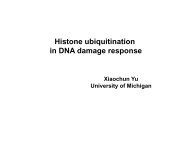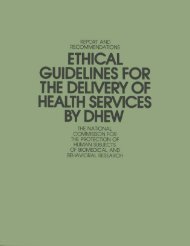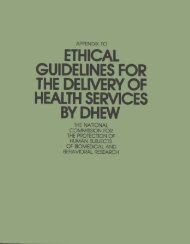RESEARCH ON THE FETUS - National Institutes of Health
RESEARCH ON THE FETUS - National Institutes of Health
RESEARCH ON THE FETUS - National Institutes of Health
Create successful ePaper yourself
Turn your PDF publications into a flip-book with our unique Google optimized e-Paper software.
parents retain control over a viable infant. Certain states, however, have<br />
written into their abortion statutes some form <strong>of</strong> parental forfeiture <strong>of</strong> rights<br />
(Louisiana, Missouri, Montana, Kentucky, Indiana, South Dakota).<br />
Dean Wilson suggests that, at least with respect to therapeutic research,<br />
the power <strong>of</strong> consent should not be removed from a mother and father because they<br />
are minors. Also, he expresses the belief that only therapeutic research should<br />
be conducted on the viable infant.<br />
The Fetus In Utero. Although the fetus does not achieve the interests <strong>of</strong><br />
a full person until live birth, it is not entirely without protection while still<br />
in utero. Pr<strong>of</strong>essor Capron points out that the criminal law in various states,<br />
with expansions under civil law, recognizes interests <strong>of</strong> the fetus in utero in<br />
two ways <strong>of</strong> possible relevance to research. First, there are some recent statutes<br />
seeking to safeguard the fetus in utero against life-threatening intentional<br />
injury, and some older statutes that depart from the common law by prohibiting<br />
"feticide." It is unlikely that the older statutes would apply to research on<br />
the fetus, since the element <strong>of</strong> intent to do harm would be missing. All <strong>of</strong> these<br />
statutes must, <strong>of</strong> course, be examined in the light <strong>of</strong> Roe v . Wade .<br />
Second, interests <strong>of</strong> the fetus in utero are recognized in the criminal<br />
law by protecting the fetus against injuries which cause its death or impairment<br />
after it is born alive. The effect <strong>of</strong> such protection is to put pressure on<br />
those involved to assure that the abortion is "effective." Thus, Pr<strong>of</strong>essor<br />
Capron suggests, the law may be recognizing, not fetal interests, but the interests<br />
<strong>of</strong> human beings, after birth, not to suffer because <strong>of</strong> culpable acts <strong>of</strong><br />
other persons.<br />
In some jurisdictions, Pr<strong>of</strong>essor Capron finds that the civil law recognizes<br />
a broader fetal interest in protection against harm in utero. The courts in at<br />
least 21 states have recognized a cause <strong>of</strong> action for injuries to a viable fetus<br />
that lead to its stillbirth. Once the fetus is viable, Pr<strong>of</strong>essor Capron states,<br />
the decision in Roe v . Wade does not appear to be an absolute bar to holding that<br />
the fetus and its parents have an interest in its potentiality for life.<br />
If the fetus is in fact born alive, the protection under civil law is even<br />
broader, with no importance being attached to the question whether the injury<br />
27











